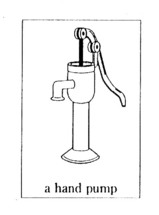
━━━━━━━━━━━━━━━━━━━━━━━━━━━━━ ◆◆ 2003年・公立高校入試・英語長文 ◆◆ 中3用 ━━━━━━━━━━━━━━━━━━━━━━━━━━━━━ ━━━━━━━━━━━━━━━━━━━━━━━━━━━━━ 第19回 鹿児島県の長文 ━━━━━━━━━━━━━━━━━━━━━━━━━━━━━ 【目次】 1.今日の単語 2.今日の先読み 3.今日の本文 4.塾長のコメント ━━━━━━━━━━━━━━━━━━━━━━━━━━━━ バックナンバー No.5〜 No.10 をアップしました。 ━ < 1.今日の単語 > ━━━━━━━━━━━━━━━━━ $ = dollar(s) ドル(通貨の単位) hard 懸命に newspaper 新聞 drilling machine 穴を掘るための機械 ━< 2.今日の先読み >━━━━━━━━━━━━━━━━━ 今日の先読みは、単語だけからは無理ですから、問題文と挿絵を見た上 でやって下さい。 ━< 3.今日の本文 >━━━━━━━━━━━━━━━━━━ 次の文は、アフリカのある学校に作られた井戸(well)についての話です。 ※(塾長より)この文には井戸の手動式くみ上げポンプ(hand pump)の 挿絵があります。読む前に下の挿絵を確認して下さい。 |

| では本文です。 ------------------------------------------------------ It was January 1995 in New York. Peter was seven years old. He was surprised when he was listening to his teacher in class. She talked about children in poor parts of Africa. She said, "They don't have much food or good water there, so many children die. They need more wells, but need * $2,000 for one. If they have $ 70, they can buy a hand pump for a well." That day, when he came home, he said, "Mom, I need $70 for a hand pump for the children of Africa!" "If you really want the money, you should do some work for our dad and me," she said. He cleaned the house and got two * dollars. He did, many other things for the money, but in March, he had only $30. So he tried * hard to get $40 more. At last, when he got $70, he gave the money to a volunteer group. Mr. Lee, a member of the group, said, "Thank you very much. We can buy a hand pump." Peter was happy and said, "I'll do more work for a well." People read a story about Peter in a * newspaper, and helped him. When Peter had $2,000, he talked with Mr. Lee. Mr. Lee told him about a village in Africa. In this village many people lived near the school and needed a well. So they chose to make the well at the school. Mr. Lee said, "It will be easier to make wells if we use a * drilling machine: We need $25,000 for one." In May, many people saw Peter on TV, and sent him a lot of money. In July, he had $7,000. Then other children in his school became interested in Peter's plan and helped him. Peter and his friends sent letters and their pictures to the children of the school in Africa. Two months later Peter got a letter and pictures from Harry, a boy who was eight years old. In the letter, Harry wrote a lot about life in his village, so Peter wanted to go there and meet him. In November, at last, he got the money for the drilling machine. Then in June, Peter and his parents visited the village with Mr. Lee. At the school many people welcomed them around the new well. The well had these words: Peter's Well: Made by Peter for Our Village. Harry came to Peter and said, "Hello. I'm Harry." "Hi, Harry. I' ve wanted to see you," Peter answered. They looked happy. An old man said, "Look around at our children. They are all right now. Peter and our friends in New York have done something great for us. For us. water is life." Then Peter said, "I will never forget this most wonderful day!" -------------------------------------------------------- 【問題1】 村人にとって必要な井戸を Harry の学校に作ることになったのはなぜ か。その理由を25字以内の日本語で書きなさい。 【問題2】 つぎの A, B, C, D を本文の流れに沿って並べなさい。 A. Peter sent pictures and wrote to the children in Africa. B. Peter went to Africa with his parents and Mr. Lee. C. Peter worked hard to get the money for a hand pump. D. Peter heard a story about poor children in Africa. ━< 4.塾長のコメント >━━━━━━━━━━━━━━━━━ アフリカに井戸を掘るというお話でした。この英文を選んだ理由は、私にも似たような経験があったからです。といっても実際に井戸を掘ったり、現地に行ったりと言うことではなく、井戸掘りのための寄付金を贈っていたということなんですが…。 私は大学時代、開発経済学というのに興味を持っていて、途上国の経済開発とか先進国からの援助といったものに関する本をいくらか読む機会がありました。そこで知ったことの一つに「水の問題」がありました。アジアやアフリカでは、新鮮な飲み水が手に入らない地域が非常に多いこと、新鮮な水がないために病気も治りにくいこと、などです。雨量の多い地域でも、必ずしも井戸があるわけではなく、川の泥水を生活用水に当てている人たちがたくさんいるのです。(砂漠やステップ地帯で水が少ないのは分かりますが、雨量の多い地域でも水に困っている、というのは驚きでした。) 大学生だった私は、途上国に機械や自動車を援助する前に、井戸を掘る方が先じゃないかと考えました。たまたま知ったボランティア団体が、インドとインドネシアを中心に井戸を掘る事業をやっているということを知り、毎年なにがしかのお金を寄付したり、雑用を手伝いに行ったりということをしました。(いつの間にか寄付も雑用も遠のいてしまいましたが…) その団体は今でも活動をおこなっていますので、興味がある人はHPをのぞいてみてください。正会員になるには中高生では金額的に無理ですが、寄付金ならお小遣い程度でも大歓迎だと思いますよ。 http://www.ne.jp/asahi/life/home/index.html ところで、先進国が途上国に援助をするというのは、実は口で言うほど簡単なことではないのです。援助しても無駄になる場合もあれば、援助自体が悪い結果を招くこともあるようです。先進国の基準で ものを考えて、現地の実情(歴史や習慣も含めて)を無視するととんでもないことになるのです。 たとえば、今回の英文に出てきた井戸の援助を考えてみましょう。英文の挿絵(hand pump)を見た人の中には、「えらく古いタイプの井戸だなあ!」とか「どうせ援助するんなら、もっといい設備を贈ればいいのに」と思った人がいるかも知れません。そこで、ちょっと考えましょう。掘った井戸から水をくみ上げる方法として、大まかに2つに分けたとします。 1.人の力でくみ上げる 2.モーター式でくみ上げる 工業先進国日本から井戸を援助する、という発想しかないと「2.モーター式」ということになります。しかしです。井戸を必要としているような場所に電気が来ている保証はありません。ガソリンで動くモーターですか?でもガソリンを買うお金なんてありませんよ、それも援助するのですか?これからずーと? もしモーターが壊れたらどうします?ネジ1本、機械油一滴もないのですよ、そのような村には。 …仮にあったとしても誰が修理するのですか?最新式の機械ですよ。…という感じで、様々な問題が起こってくるのです。 井戸とは限りませんが、先進国から援助された最新式の機械が動かなくなり、修理できなくて赤サビのまま放置されている、という状況がかなりあると聞きます。 このように現地の実情にあわない援助は、ありがた迷惑にもなりうるのです。そういう意味では、今回の英文の中で主人公たちが hand pump 式の井戸を贈ったというのは、別に時代遅れでも何でもないのです。 将来皆さんの中には、開発援助の仕事をする人や、ボランティアの活動をする人が出てくるかも知れませんが、支援する側の立場だけから考えるのは危険だということをちょっと頭の片隅に入れておくのも無駄ではないと思います。 ----------------------------------------------------------- 問題1(解答例)そこの村人の多くが学校の近くに住んでいたから。 問題2 答 D C A B |